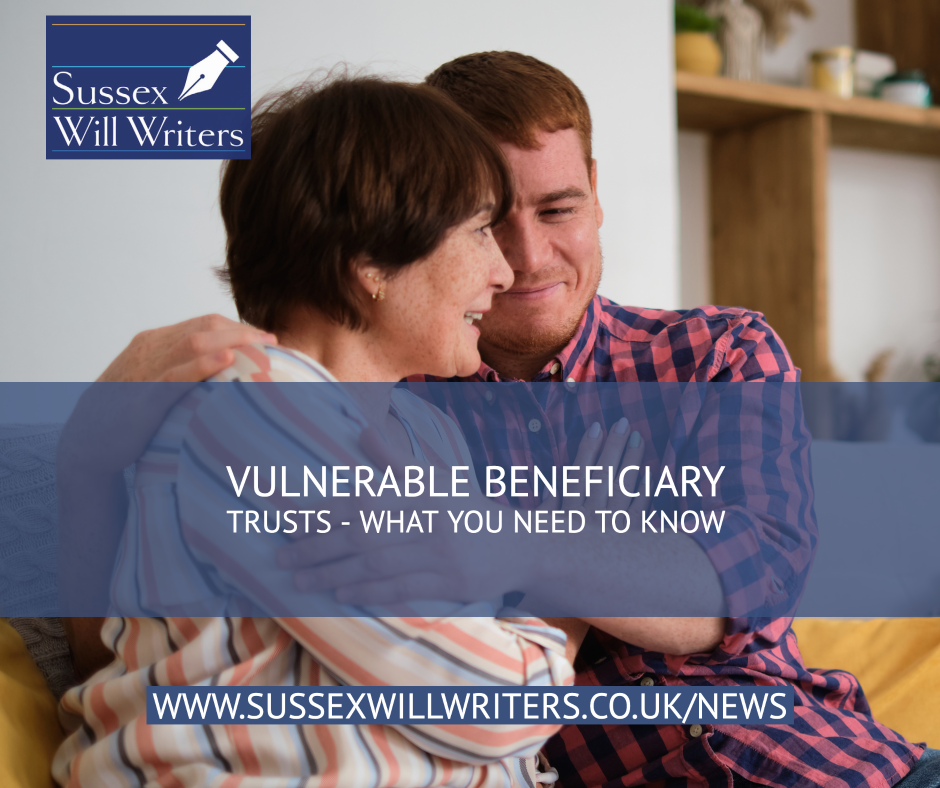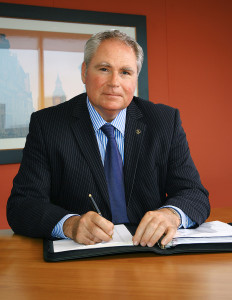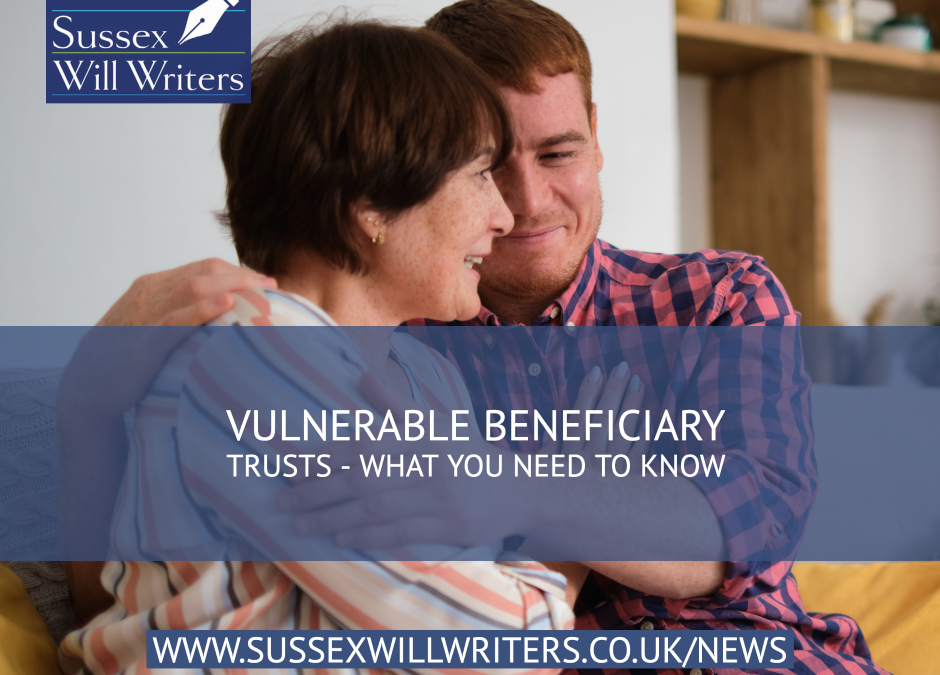
From: The Will Company
Trusts for Vulnerable People
Some Trusts for disabled people or children get special tax treatment. These are called ‘Trusts for vulnerable beneficiaries’.
Who Qualifies as a Vulnerable Beneficiary
A vulnerable beneficiary is either someone under 18 whose parent has died or a disabled person who is eligible for any of the following benefits (even if they do not receive them):
- Disability Living Allowance for adults or Disability Living Allowance for children (either the care component at the highest or middle rate, or the mobility component at the higher rate)
A vulnerable beneficiary can also be someone who is unable to manage their own affairs because of a mental health condition – check with a medical professional that it’s covered by the Mental Health Act 1983.
Trusts that Qualify for Special Tax Treatment
A Trust does not qualify for special Income Tax treatment if the person setting it up can benefit from the Trust income. However, from 2008 to 2009 it would qualify for special Capital Gains Tax treatment.
Trusts for children who’ve lost a parent are usually set up by the parent’s Will, or by special rules of inheritance if there’s no Will.
If someone dies without a Will in Scotland, a Trust set up there for their children is usually treated as a Bare Trust for tax purposes.
If There’s More than One Beneficiary
If there are beneficiaries who are not vulnerable, the assets and income for the vulnerable beneficiary must be:
- Identified and kept separate
- Used only for that person
Only that part of the Trust gets special tax treatment.
Claiming Special Tax Treatment
To claim special treatment for Income Tax and Capital Gains Tax, the trustees have to fill in the ‘Vulnerable Person Election’ form.
If there’s more than one vulnerable beneficiary, each needs a separate form.
The trustees and beneficiary must both sign the form.
If the vulnerable person dies or is no longer vulnerable, the trustees must tell HMRC.
Income Tax
In a Trust with a vulnerable beneficiary, the trustees are entitled to a deduction of Income Tax. It’s calculated like this:
- Trustees work out what their Trust Income Tax would be if there was no claim for special treatment – this will vary according to which type of Trust it is.
- They then work out what Income Tax the vulnerable person would have paid if the Trust income had been paid directly to them as an individual.
- They can then claim the difference between these 2 figures as a deduction from their own Income Tax liability.
This is a complicated calculation but there’s a detailed worked example on the HMRC website.
Capital Gains Tax
Capital Gains Tax may be due if assets are sold, given away, exchanged or transferred in another way and they’ve gone up in value since being put into Trust.
Tax is only paid by trustees if the assets have increased in value above the Trust’s tax-free allowance (called the ‘annual exempt amount’).
For the 2023 to 2024 tax year, the tax-free allowance for Trusts is:
- £6,000 for vulnerable beneficiaries
- £3,000 for other trustees
You can see the tax-free allowance for previous tax years.
Trustees are responsible for paying any Capital Gains Tax due. If the Trust is for vulnerable people, trustees can claim a reduction, which is calculated like this:
- They work out what they would pay if there was no reduction.
- They then work out what the beneficiary would have to pay if the gains had come directly to them.
- They can claim the difference between these 2 amounts as a reduction on what they have to pay in Capital Gains Tax using form SA905.
This special Capital Gains Tax treatment does not apply in the tax year when the beneficiary dies.
Inheritance Tax
These are the situations when Trusts for vulnerable people get special Inheritance Tax treatment:
- Tor a disabled person whose Trust was set up before 8 April 2013 – at least half of the payments from the Trust must go to the disabled person during their lifetime.
- For a disabled person whose Trust was set up on or after 8 April 2013 – all payments must go to the disabled person, except for up to £3,000 per year (or 3% of the assets, if that’s lower), which can be used for someone else’s benefit.
- When someone who has a condition that’s expected to make them disabled sets up a trust for themselves.
- For a bereaved minor – they must take all the assets and income at (or before becoming) 18.
There’s no Inheritance Tax charge:
- If the person who set up the Trust survives 7 years from the date they set it up.
- On transfers made out of a Trust to a vulnerable beneficiary.
When the beneficiary dies, any assets held in the Trust on their behalf are treated as part of their estate and Inheritance Tax may be charged.
Trusts usually have 10-year Inheritance Tax charges, but Trusts with vulnerable beneficiaries are exempt.
https://www.gov.uk/trusts-taxes/trusts-for-vulnerable-people
Speak to Sussex Will Writers about organising your estate, Will and Lasting Power of Attorney.
Click to Call us on 01903 533681
or get in touch by emailing: info@sussexwillwriters.co.uk
 Sussex Will Writers
Sussex Will Writers
T: 01903 533681
M: 07734 744886
E: info@sussexwillwriters.co.uk
Could you do with some FREE, sound advice on:
- Writing a Will – What do I need and how much does it cost?
- Creating Lasting Powers of Attorney – If I was incapacitated who can act on my behalf?
- Property Protection Trusts – Can these really save Care Home Fees?
- Pre-Paid Funeral Plans – With so many to choose from how do I decide which plan is best?

There is so much confusion on these vital areas of estate planning, that sometimes just a chat with an expert in the field can clear up misunderstanding and set out the way ahead, without all the legal jargon.
Or complete the form below
Steve Worsfold
Affiliate Member of the Society of Will Writers
Advising on Wills/Trusts/Probate/Powers of Attorney

Mobile: 07734 744886
Office: 01903 533681
Email: steve@sussexwillwriters.co.uk
Website: www.sussexwillwriters.co.uk
Protecting What’s Precious to You,
Now and in the Future
Sussex Will Writers is proud to support Dementia Friends,
an initiative of The Alzheimers Society
Our business is certified ‘Safe to do business with’ and ‘Code compliant’
by the UK’s largest regulatory body for Will Writers, The Society of Will Writers.
Steve Worsfold has been an Affiliate Member of the Society for 15 years.




